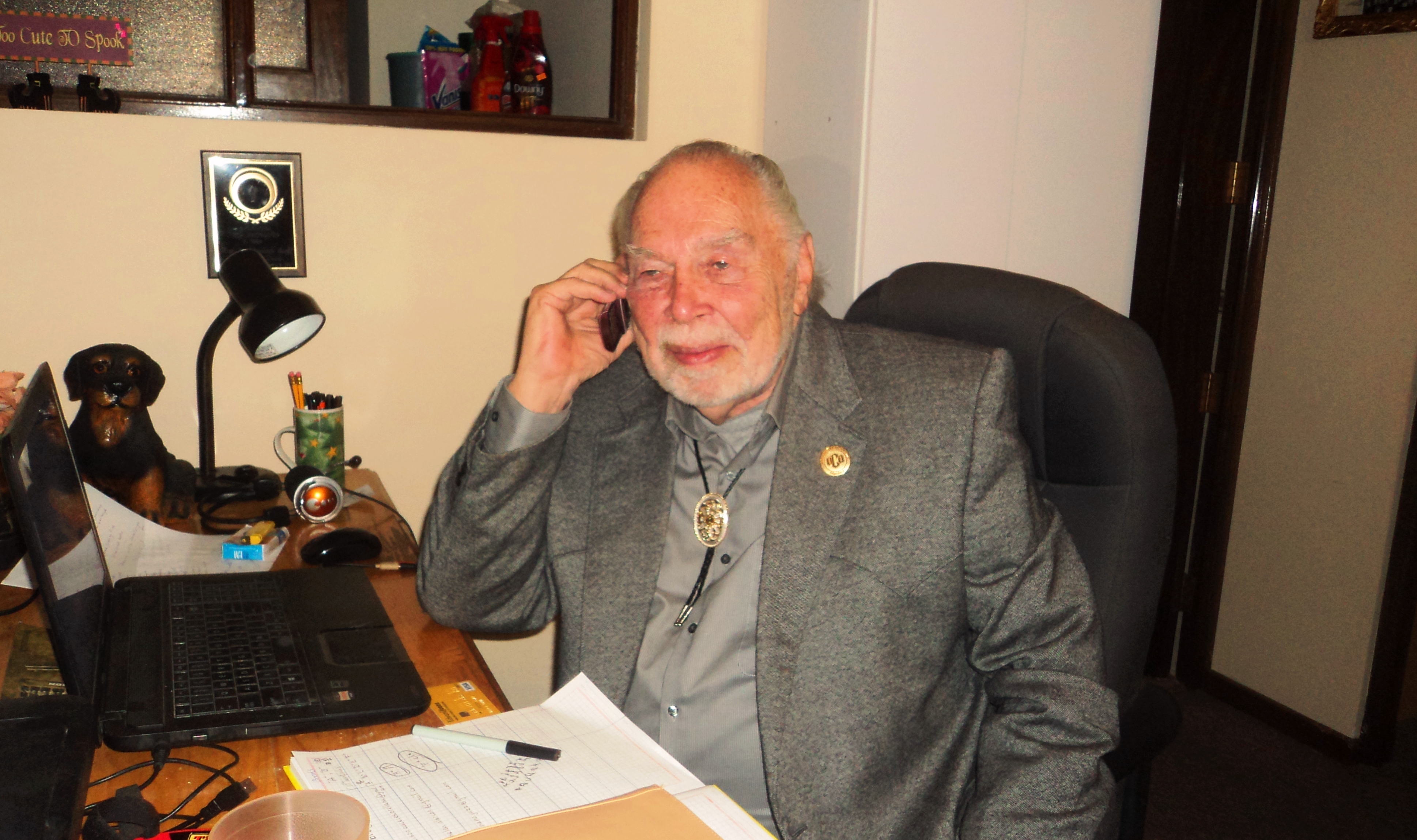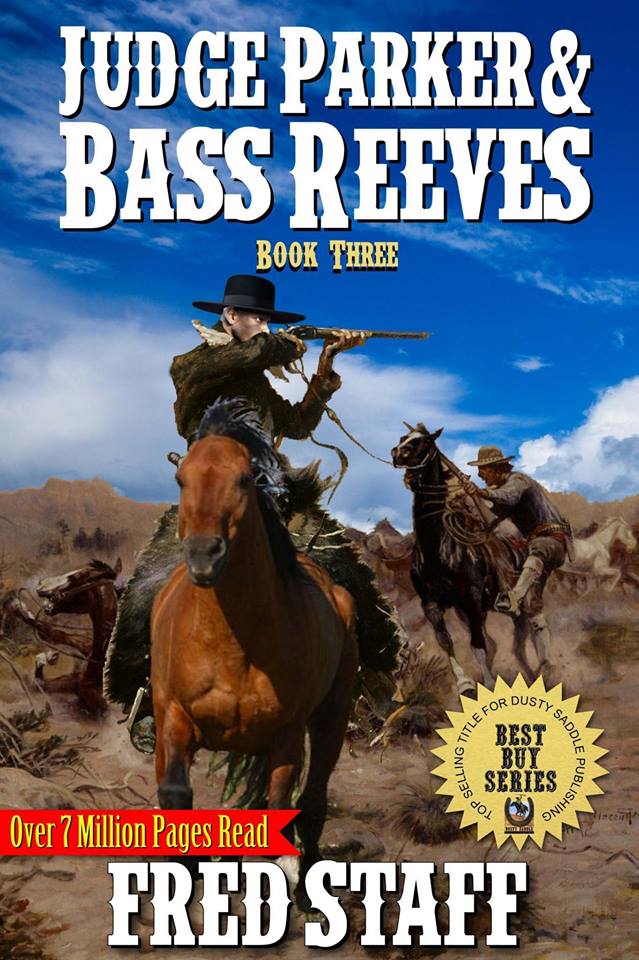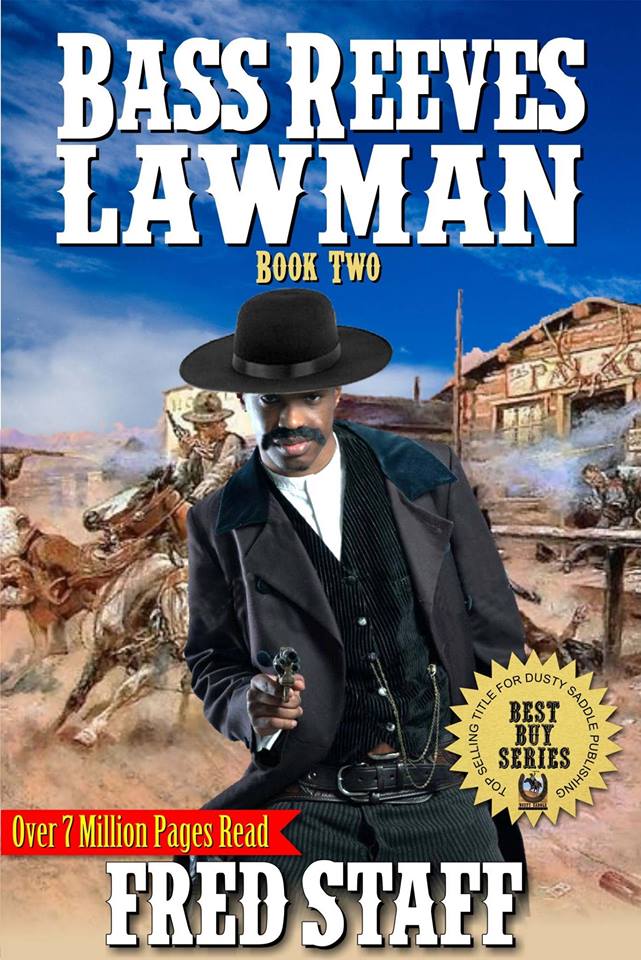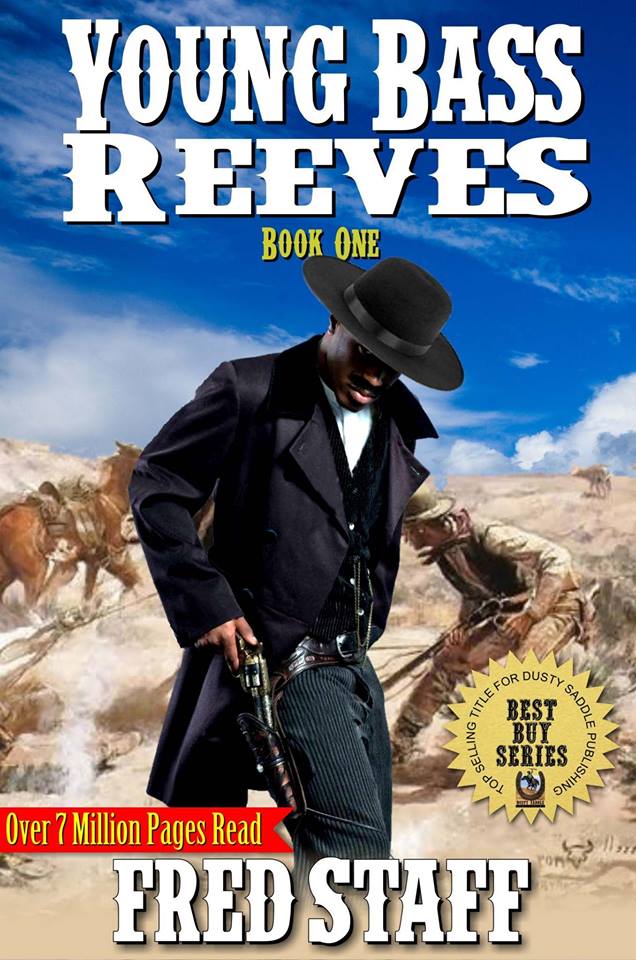A few months ago, Fred Staff had been a successful author but he hadn’t become accustomed to living in the top 100. Now, just a few weeks later, he has been riding high on the bestseller list. His popular trilogy has been thrilling Western readers around the world, and he has a new book on the way. Few interviews have been conducted with Staff—who lives in Bolivia—so this is a first. An exclusive interview with the man who has helped pull Bass Reeves out from the wilderness into the spotlight, a living, breathing legend once more…
******

Fred Staff, doing what Fred does best. Taking care of business at his desk in Bolivia.
Fred, thank you for agreeing to this interview. It’s an absolute pleasure to finally have you in Westerner Magazine.
It’s my pleasure.
I loved all three books in the Bass Reeves trilogy. You must be incredibly happy with the way those books have performed on the market.
I’m very happy about it. I needed a hit, and all of a sudden, I got three of them. When it rains it really, really pours, doesn’t it?
It really does. Are you ever surprised by the success your Bass Reeves trilogy has had?
Yes. Probably. Yes. When I started writing, there was only one book about him. It was his autobiography, and it was extremely well researched but… alas… it’s boring. I took that dull book, the events, the historical truth and turned it into action. It was a straightforward process. But I did have to go through the pain of reading his dry book. When I write historically based novels, it’s pretty easy—you can find the facts, you know the story and then you just have to go back to who, what, where and why. Who did it? Where did he do it? Why did he do it? It’s quite easy.
The writing process seems fairly easy for you—would you agree with that?
Oh, yeah! This book I’m working on right now is one of the first times I’ve stalled. The only other time I’ve stalled was during Cherokee Bill. Why? Because he’s a psychopath. I had four sessions with a psychologist to learn and understand how psychopaths work. I wanted to really get that across to readers— and it was difficult. However, once I’d gotten through his childhood, I was off and running.
What is the biggest problem you personally face as a writer?
Discipline. I get sidelined all the time. I like to play poker. My breaks are full of poker and video games. Sometimes, I get too carried away and don’t get back to writing.
That’s the only problem?
Yep. Writing is easy for me. I’m not a flowery writer—I just tell a story. As I’ve told you, basically these books become a movie [in my head], and I’ve got my characters, where they are, where they are going and I write down what’s in my mind. It’s a movie playing in my mind. I’m not a great writer, but I’m a pretty good storyteller.
Let’s go back to the beginning. How did you get into the writing business?
Very good question. A friend of mine is one of the most avid readers I’ve ever met. I’m not much of a reader—I read a lot of history, but not fiction. We’ve been friends for years. He told me, “You know, you should write a book—you’re one of the best storytellers around.” I thought that sounded like one of the worst assignments I’d ever been given.
Did you know you could write, though?
Back in the ‘60s—1965 to 1967—I wrote proposals for government funding with some success. I managed to get thirty million dollars in funds—everything from 25,000 dollars to 250,000. It was very easy for me to write proposals because I used Hemingway’s process—who, what, why, when and how. I had very few proposals turned down.
But what was the first step in your writing journey?
In 1993, I made a trip to Potosi, Bolivia. That city is virtually unknown today, but in the 1500s it was one of the most industrialized cities in the world. It had the richest silver mine in history, and it’s where Spain got most of its economic wealth back at that time. They have a thing called “blockados” here where they block the highways if the populace is upset about anything. About three miles out of Potosi, there were rocks across the highway. I thought it had been a rockslide. I got out to move the rocks and was told it was a blockado. I ended up walking to Potosi. I got a ride on a truck farther down the road. If it hadn’t, I may have died because at 13,000 feet carrying two bags up a mountain, you aren’t going to last long. When I got to Potosi, everything was shut down except a hotel. I was sitting out on the street one day, and a Bolivian guy came down the street. He was an ex-miner who had gotten out of the mining industry. He spoke English to some degree—I have no idea where he learned it. We became good friends. Neither of us had anything to do. We would meet every day and tell stories. He loved my stories, and I loved his stories. He told me the story behind one of the books I would eventually write called “Rocha’s Treasure.” From ’93 to 2012, I kept mulling his story over in my mind. During a summer break, I decided to write that book (which took four months), put it on the market, and it became a bestseller in Bolivia. That’s a huge achievement as few people in Bolivia read—but I had a lot of sales. I had success, thought it was fun, and decided to keep doing it.
What was the process you went through to get that first book onto the market?
All it took to get that book published was money. I invested about $3,000 in that first book. I learned a lesson there, but I had success. I would have never thought I could have gotten it published.
How did you get interested in Westerns in the first place?
My addiction to Westerns started when I was a kid. Every Saturday I had to see the Western movie or my week was ruined. Later, I had a professor when I was at Central University of Oklahoma who was considered one of the best Western historians. In fact, he could seat thirty in his class, and if you didn’t sign up on the first day of his class, you’d never get a seat. He was a fantastic presenter. I was almost fifty when I took that class, and I was surrounded by a bunch of teenagers. The professor and I became friends, and I went from an Old West fan to becoming obsessed with it. After that first book, I wanted to write a Western, and I’d read about Bass Reeves as part of his course. I was fascinated by it. But I decided to write about Cherokee Bill first—but during my research for Cherokee Bill, I discovered Bass Reeves again and thought it was damn interesting, so I wrote the three Bass Reeves books. They were successful, so I decided to write the Cherokee Bill novel—then I discovered his father, George Goldsby, and ended up writing about him—then I finally got around to writing the Cherokee Bill.
So, it wasn’t for the sales or success—you wrote for the love of it?
I just loved the research and I loved telling the stories. It’s taking dull facts and turning them into action. I just got a real kick out of that. I was enjoying it. It wasn’t like I needed the money. I just enjoyed learning about history and people liked what I did, so I kept going.
Would you have kept writing even if you’d never sold a copy?
No. If no one had ever bought it, I would have quit. I got some nice reviews and sales, and that kept me going. The reviews on the Bass Reeves book were so good. I didn’t write to make money—but I have no kids and wanted to leave a legacy that someone could enjoy in thirty or forty years. Just something people can remember me by down the line.
You’ve had a varied career—does that help you with your writing?
I’ve had more crazy experiences than anyone should have. I’m sure it helps.
Can you tell us all a little about your life?
I was born in Seminole, Oklahoma. This was the heart of the homeland of the Seminole Indians. I was raised in Pawnee, Oklahoma, and the heart of the Pawnee Tribe. My early years were spent in a small town close to Ada, Oklahoma. At that time, it had the third largest rodeo in the world. I lived for that. My grandfather was mayor of Stonewall, Oklahoma and this was home to Dick Truit and Evert Shaw. They were both world champion rodeo performers. I knew these people through my grandfather and was in awe of them and their abilities.
My great uncle was an outstanding poet and he exposed me to the power of words through the writings of Robert Service. I never realized that words could paint pictures until this experience. Of course, it was also the kinds of pictures a young man full of adventure wanted painted.
My father’s office was next door to a saddle shop, and I spent many an hour there. The men who came in and sat and visited had great influence on me. They talked of old times and things that just pushed me deeper into the Old West and all the things that they actually were a part of. Like all kids in my day, the ten cent Western comic books and the Saturday movie was a must. It was always a Western, and that also shaped my love of Western stories. I remember that “Shane” blew my mind. It made me realize that riding a pretty horse and wearing a white hat wasn’t what the West was really about.
Agriculture and sports pretty much filled my early years. From the time I was twelve, I worked in the fields and was involved with raising animals. An example of how much I was into animals, I was recruited as a football player to the University of Oklahoma and they would get you the best job around for the summer so you could make money to have for school. I chose to work for HEREFORD HEAVEN—it was the top Hereford ranch in the country, owned by the past governor of the state, Roy Turner. I made very little money, but got room and board. My main job was shoveling million-dollar bull shit, and I have been doing it ever since.
I ended up being a member of a National Championship football team and am now a member of the university’s Athletic Hall of Fame. While in university, I had a professor, Royce Peterson, who took my love of Westerns and turned it into a passion. He was a man who could stand in front of a class and keep you mesmerized with the stories of the Old West. It seemed that he knew every story that ever happened. I owe any success in writing to this man, because he showed me that history was not a dry subject, but a vivid, living experience. You know in Spanish, history is the name of story and I believe with all my heart that this is the correct use of the word.
After university, I taught history and then worked for people projects, sold real estate and dabbled in oil. As soon as I could get together some funds, I went into the Registered Angus cattle business and did that for 28 years.
How did you end up living in Bolivia, of all places?
I was doing very well in the United States—but in ’82, things went to hell in Oklahoma. You could have bought the whole state for a dollar and they’d have thought they were cheating you. I went to Bolivia and mined gold off and on for five years. Fell in love with the country. I returned to the States and taught again. I ended up working in the prisons in Missouri and Kansas. I am probably the only Western writer who has worked with forty convicted murderers. I am sure I learned more from them than I taught them.

“I always loved the book,” Staff says pointing at the cover. “The one I wrote about Judge Parker and the lawman Bass Reeves.”
Okay, let me ask you this one: Are sidekicks just throwaway devices in a tale? Can they become more? Do they need to become more?
I hope that every character in my stories is there for a purpose. In fact, there are always at least three people in a story who are key elements. My first book, ROCHA’S TREASURE OF POTOSI, had a terrifically powerful sidekick whom the protagonist depended on for advice and protection. There will be a sequel to the Rocha book, and his sidekick will be the protagonist in it. His brothers will also be strong characters in the following book. The book became a bestseller in Bolivia. This really got me into writing, because there aren’t that many readers in Bolivia and even fewer that read English.
My BASS REEVES TRILOGY had so many real and famous people in it that a book could have and/or has been written about several of them. This series has had tremendous success, and I am so proud of the fact that I took a lot of pretty dry facts and was able to bring the most exciting parts of his life to the attention of so many readers.
SERGEANT GOLDSBY AND THE 10TH CAVALRY is also filled with real people who played an important part in the development of the West. The cover on this book was done by Fredric Remington, a famous name of the West, and he said when the story of the West is written that this story had to be told. Interestingly, I had already written the story, when I found his sketch and statement. Its sequel, THE OTHER GOLDSBY, CHEROKEE BILL, will have many of the same characters, plus some other notorious people from the time. This book is an adult novel, as he was a psychopath and the most feared man of the time in Indian Territory. This is the most complete story of his life ever written and took me months of research. The photograph used on the cover sold for 30,000 and the rifle in his hands sold for 70,000 dollars at a recent auction, and since I am the one who wrote his story, I take credit for his fame (laughs).
INDOMITABLE is based on the unbelievable story of Larcena Pennington. It is set in Arizona in the mid-1850s and involves the most challenging quest for survival I have ever researched. It also covers the Bascom affair, which lead to the Apache war. It has several famous Arizona people throughout the book. I have often said that if you liked the movie REVENANT, you will love this story, as Larcena goes through a lot more in her quest for survival than Hugh Glass did, and her story goes on into the most violent time in the history of Arizona. She proves that there is no such thing as the weaker sex, or if there is, it is placed on the wrong gender.
QUANTRILL’S REVENGE is based on the early life of William Clark Quantrill up through the Lawrence raid. Many famous people are in this book, and the story was put together with readings from the Kansas and Missouri historical societies and newspaper articles as well as writings from people who were on the scene. It was an interesting research project and what I present may change some people’s minds about the man.
I am presently writing my first fiction novel. It will have a lot of famous names in it, but is totally fiction. The title of the book is BASS REEVES AND KATIE QUANTRILL. I promise my readers a trip that won’t be forgotten. It should be out by the time this magazine is published.
Well, you certainly came up with something I didn’t know about you. What would your advice be to a younger writer starting out in the business?
Hemingway gives the best advice of anyone I’ve read: You write everyday—you never, never stop when you run out of words. Always have something you’re going to write the next day. Always read what you wrote the day before, and then it’s back to answering those questions—Who? What? Where? Why?
What’s the greatest compliment you’ve been given as a writer?
Reviewers have told me how well my books flow—I think that’s the greatest compliment.
Let me ask you this: Do you enjoy other Western writers?
Yes, at times I think they are better than me. I am always checking out other writers, and I’m often impressed by the books other writers are releasing.
Now to the million-dollar question. How do you promote your books?
I worked for a guy when I sold real estate who was very wealthy—back when the oil business ran the state. He decided that he would drill oil and he hired a top-notch oil engineer. They would have drilling meetings and the engineer would tell him where to drill, and he would ignore the advice and drill wherever he wanted to. You don’t hire an expert to ignore what they have to say. That’s how I operate. I write the books, and my publicist promotes them. We don’t interfere in each other’s business.
Western book sales are said to be going through the roof—
Well, I guess I’m in the right business then…. By accident (laughs).
Does it surprise you that Westerns are still such strong sellers?
I’m shocked, because in my mind the only guy I knew who ever really read Westerns had a bookshelf with over one hundred paperback books on that shelf. He’d read every one of them. Just an old country boy. In my mind, I visualized all Western readers as guys my age who had lived the lifestyle to some degree. I didn’t realize how popular Westerns were with the female readership. I’m surprised by the Westerns, their success and the readership every single day.

“Lawman took me some time to write but it was sure good seeing how well it went down with the readers,” Staff explains.
What would your advice be to a new up-and-coming writer?
The best advice I have ever gotten came from a friend, Dennis Hambright, who is a very good mystery writer. He told me to write. Don’t worry about spelling or punctuation; just get your thoughts down. An empty page is just that. You can always go back and add, delete and correct. Ernest Hemingway’s style is the one that I use most. Answer the questions. Who, What, Where, When, Why and How. I have had a lot of people compliment me on my flow of the story, and I submit that these are the reasons. Editing is far harder than writing. Wait at least a day before trying to edit, but it is best a week and read it out loud. Hemingway said never write until you run out of words. Always know where you are going to start the next day. Read the work you have done before you continue. If it is too long, at least read the chapter before.
Well, thank you for your time, Fred. It’s been an absolute pleasure talking to you.
And you! Thank you for a great interview. I’m pleased as heck to be accepted, and pleased as heck that readers and writers have written nicely about what I’ve done. I respect them and I hope I learn a little bit from them. I’m writing to please people, and when I find out I did, it makes my day. Pleasing the audience is more important to me than money.
Based on the truth life story of the most outstanding Marshal to ever serve in Judge Parkers court!
Somewhere, somehow, someone has to pay. Someone, somehow, somewhere, there’s a murderer who has conspired to blow apart a world. Between the light and the endless night, he has taken someone’s life. Enter Bass Reeves: The Marshal who will at all costs bring the guilty to justice. He will follow any criminal to the ends of the earth. There’s no bribing him, there’s no avoiding him. He is justice incarnate. He is judge, jury and executioner… He is the law for the lawless.
This is a fast-moving, action-packed Western, based on the true life of the legendary United States Marshal Bass Reeves. A man who rose from slavery and escaped into Indian Territory during the Civil War to become the most feared lawman of his time. He served for over thirty years and brought more than three thousand violent men to justice before the famous Hanging Judge Issac Parker in Fort Smith, Arkansas. His amazing story is full of adventure and courage. His place in history is now reassessed, and his gun will bring justice to your neighborhood. Click here to purchase your copy today for 99 cents!


You must log in to post a comment.